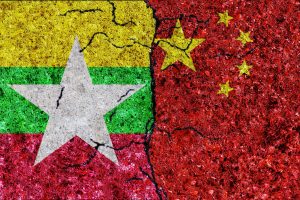Myanmar’s military chief will pay a trip to China later this week to attend a regional summit, his second to the country since the 2021 coup, the country’s military administration announced yesterday.
According to a report today in the Global New Light of Myanmar, Senior Gen. Min Aung Hlaing will depart “soon” for China for a “working visit” during which he will attend a summit of the Shanghai Cooperation Organization, which is due to start in Tianjin on Sunday. On the sidelines of the summit, he is slated to meet Chinese President Xi Jinping as well as other attending heads of state, the paper reported.
He will then travel to Beijing to attend the Victory Day Parade marking the 80th anniversary of China’s victory over the Japanese in World War II on September 3.
In addition to the topline diplomatic meetings, the Global New Light of Myanmar stated, Min Aung Hlaing will “go sightseeing around landmarks in China and observe education, industrial manufacturing and economic sectors.” He will also “hold talks about further development and strengthening of cooperation in friendship, economic and other sectors between the two governments and people of both countries.”
The trip will be Min Aung Hlaing’s second to China since leading the coup d’état that overthrew Myanmar’s civilian government in February 2021. The first was in November of last year, when he attended summits of the Greater Mekong Subregion and the Ayeyarwady-Chao Phraya-Mekong Economic Cooperation Strategy in Kunming. It is notable that in both cases, Min Aung Hlaing has been invited to attend a multilateral summit rather than being hosted with full bilateral red-carpet honors in Beijing, a pattern that has also characterized the visits of less senior junta officials to China.
While the junta did not offer many specific details of what will be discussed during the trip, it is likely that Min Aung Hlaing will update his Chinese counterparts about his regime’s controversial election plans. The military has announced that the first phase of the election will be held on December 28, with subsequent phases to take place throughout January, due to the highly uncertain security situation in large swathes of the country.
The Myanmar military has described the election as a means of handing power back to a civilian government, but has been dismissed nearly universally as a ploy to preserve the generals’ hold on power behind a civilian façade. While the election result is unlikely to be accepted by Western democracies, the military is probably hoping that its main neighbors will normalize their relations with whatever quasi-civilian government emerges from it.
China has repeatedly expressed its support for the electoral process. The issue was discussed during Min Aung Hlaing’s visit to Kunming last year, and has topped the agenda during recent diplomatic engagements between Beijing and Naypyidaw. During a meeting on the sidelines of another multilateral meeting in Yunnan province last month, the junta’s Foreign Minister Than Swe met with his Chinese counterpart Wang Yi who expressed hope that the election would achieve three goals: “first, domestic peace with a cessation of hostilities among parties and national governance based on the will of the people; second, national reconciliation and broadest solidarity and third, social harmony, advancement of post-earthquake reconstruction and economic development, and improvement of people’s lives.”
It is clear that even though Chinese leaders were blindsided by the 2021 coup, and have been frustrated with the Myanmar military’s self-defeating policies, they view the election as the best (perhaps the only) possible means of resolving the current civil war. Beijing also hopes that this will help shore up the central government’s control and prevent Myanmar’s further fragmentation – something that would threaten key Chinese strategic objectives, including the creation of an infrastructure corridor linking Myanmar’s coast with the upland border regions of Yunnan province. It also likely reflects Beijing’s concern about the supposedly pro-Western orientation of the National Unity Government and other resistance groups, and its skepticism that they offer a workable alternative to the military.
Since at least Min Aung Hlaing’s first visit to China last year, this consideration has emerged as a key goal of Chinese policy toward Myanmar. This year, Beijing has pressured ethnic armed groups, including the Kachin Independence Army, Arakan Army, Myanmar National Democratic Alliance Army (MNDAA), and Ta’ang National Liberation Army, to agree to ceasefires with the Myanmar military, and even to relinquish territory that they captured during the sweeping offensives in late 2023 and 2024. The most significant of these was the city of Lashio, the de facto capital of northern Shan State, which the MNDAA captured in August of last year. The group handed the city back to the junta authorities, under the supervision of a Chinese peacekeeping team, in April.

































